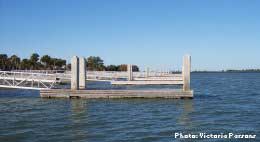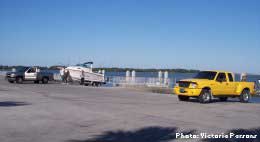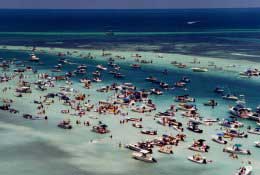
|
Growing Number of Boats Makes Getting Wet Harder
By Victoria Parsons |
Left: A single ramp at the end of a narrow causeway slicing through the Cockroach Bay Aquatic Preserve attracts boaters from Hillsborough, Polk and Manatee counties. |
| By the Numbers |
| 2.25 million |
Number of people in Tampa Bay region (Hillsborough, Pinellas and Manatee counties) |
| 111,000 |
Boats registered in the same region |
| 54 |
Public access boat ramps in the region |
| ¸ |
Between half and two-thirds of boaters trailer their boats to public launch sites. |
| 45.2 |
Average number of trips per year for boat owners who use public ramps |
| 7:00 a.m. |
The average departure time for boaters leaving Tampa Bay ramps. |
| 8 |
Hours for the average trip |
| 90 |
Percentage of boaters leaving Tampa Bay ramps to fish |
|
|
Bill Sargent, a scientist with the Florida Fish and Wildlife Research Institute, probably knows more about the problems facing boaters than anyone else in the state. As a researcher, he&'s compiled a series of reports on boat ramp usage. In his free time, however, he trailers a boat to one of Pinellas County's busy launch sites.
"Pinellas has some of the best ramps in the state, but you better get there early on nice weekends," he says. "If you're not there at dawn, you probably won't be able to find a parking space."
While frustrating for individual boat owners, the problems of saltwater boat access challenge a $14 billion industry that provides more than 180,000 jobs across the state - nearly twice the economic impact of the citrus industry. And while Tampa Bay boaters still have it good compared to some urban counties on the state's east coast, bay managers say now is the time to act, particularly in Hillsborough and Manatee counties where some waterfront land still remains.
The challenge is a convergence of trends. Retiring baby boomers have pushed the price of waterfront real estate to an all-time high so developers are transforming long-time marinas into upscale condominiums. At the same time, government agencies are purchasing land to preserve. Enhanced environmental regulations also restrict development of boat ramps on both public and private properties.
 On the other hand, the number of boats in the state has skyrocketed, growing by 51.7% to 978,225 registered craft between 1987 and 2003 - nearly twice the rate of the state's population increase. During that same period, the Florida Department of Environmental Protection estimates that 200 saltwater marinas were closed and dry storage slips declined by 1620 slots. More than 140 lanes at saltwater ramps were added, but that did not offset the loss of access in other areas when combined with the increased number of boats. Between half and two-thirds of the boat owners in Florida trailer their boats to public access launch sites, causing crowds at even large ramps like Fort DeSoto Park. Small ramps in good locations may attract boaters from multiple counties, jeopardizing surrounding seagrasses and mangrove forests. On the other hand, the number of boats in the state has skyrocketed, growing by 51.7% to 978,225 registered craft between 1987 and 2003 - nearly twice the rate of the state's population increase. During that same period, the Florida Department of Environmental Protection estimates that 200 saltwater marinas were closed and dry storage slips declined by 1620 slots. More than 140 lanes at saltwater ramps were added, but that did not offset the loss of access in other areas when combined with the increased number of boats. Between half and two-thirds of the boat owners in Florida trailer their boats to public access launch sites, causing crowds at even large ramps like Fort DeSoto Park. Small ramps in good locations may attract boaters from multiple counties, jeopardizing surrounding seagrasses and mangrove forests.
There's no easy answer. Most - but not all - boaters agree that mangroves and seagrass beds near popular launch spots like Cockroach Bay or Honeymoon Island preclude expansion of those sites. Purchasing land for new boat ramps raises other issues, including how they are financed and how much influence neighbors should have on potential public use.
Then there&'s the issue of who's in charge and who should pay for new or expanded facilities. Although local ramps typically are partially funded with state moneys, boaters don't recognize city or county boundaries when they're looking for a place to launch. Boaters at ramps as different as Fort DeSoto Park and Cockroach Bay, for instance, may travel 50 to 90 miles to launch their boats from a preferred location.
Crowds Jeopardize Preserve
A single ramp at the end of a narrow causeway that slices through an aquatic preserve, Cockroach Bay provides the closest access to fishing spots near the mouth of Tampa Bay for boaters in south Hillsborough, Polk and other surrounding counties. It's part of a hard-won corridor of nature preserves that stretch 20 miles north from the county's boundary to protect the shoreline from development.
On nice weekends, however, up to 200 trucks and trailers line the causeway and it may take more than an hour to launch a boat. While some local boaters have lobbied for expanded facilities, including double ramps, more parking, picnic areas and restrooms, bay managers are resisting, saying that the ramp is already overused by overly large boats.
To take a careful look at alternatives, the Tampa Bay Regional Planning Council's Agency on Bay Management created a recreational boat launch task force last year. A series of meetings and site reviews resulted in a firm "no" for potential sites near the Sunshine Skyway Bridge.
"The state Department of Transportation (DOT) justifiably refused to allow boat ramps on the causeways leading to the Sunshine Skyway Bridge," notes Suzanne Cooper, staff to the Agency on Bay Management. "The parking lots are already at capacity and large numbers of vehicles pulling boats and trailers near the interstate could be dangerous."
On the other hand, the DOT did give into public pressure when it tried to sell a piece of property near the Salty Sol Fleischman Boat Ramp in Tampa south of Gandy Bridge. Although the two-acre site is currently vacant, fishermen argued that the ramp's parking lot - which holds about 120 cars and trailers - already is overflowing on weekends. The Hillsborough County Commission unanimously agreed to ask DOT for a chance to buy the property, and DOT decided to allow the county to continue to lease the land for free.
Tide Still Out
Further south, closer to the fish-rich waters near the Sunshine Skyway Bridge, the tide is still out on an option that might relieve the Cockroach Bay ramp: a privately owned parcel with easy access to a deep stretch of the Manatee River that is up for rezoning. Citizen complaints about plans to build hundreds of housing units prompted the owner to postpone hearings originally scheduled for early this year, but the county has made no overtures toward purchasing the 167-acre parcel.
"We&'re not taking a position on that," said Peter Fowler, resource department manager for the county's parks and recreation department. Previous owners had indicated they did not want to participate in the county&'s environmental lands program, and current owners have not approached the county about buying the land.
Instead, Fowler is hoping that a deeper channel at E.G. Simmons Park in Ruskin will attract deeper-draft boats and help alleviate both congestion and damage to seagrass beds in Cockroach Bay. "It's the first time in a long time we've dredged that channel, and it's rare that the parking lot at Simmons fills up so it will be interesting to see what happens. We certainly hope it will alleviate Cockroach Bay," Fowler said.
Pinellas Prepares For Crowds
 |
 |
| Calm Before The Storm: Just after dawn one cold and blustery morning, the boat ramps at Fort DeSoto Park are still empty. The parking lot is full by 9 a.m. most weekend mornings. |
On the other side of the bay - and the opposite end of the spectrum — Fort DeSoto Park features 24 brand-new, extra wide ramps to speed launching times. It's one of the state's largest and busiest ramps with parking for about 350 vehicles. Still, the parking lot fills up early on weekends when the weather is nice, with some boaters coming from as far away as Lake City or Okeechobee, including a large percentage from Hillsborough, Polk and Manatee counties.
A $5 parking fee, originally implemented on a voluntary basis to help cover the costs of maintaining the county's largest ramps, isn't working as well as expected, said Joe Lupardus, operations manager for the county's parks and recreation department. "We're going to have to try some pilot programs with tighter controls," he noted.
Different charges for out-of-county residents probably won't happen, he adds. "We've been told by the county attorney we can't do it and some of our ramps were built with state funds so we shouldn't try to differentiate between counties based on license tags."
Recognizing that continued boat access is critical, particularly in the state's most densely populated county, Assistant County Administrator Jake Stowers has created a task force composed of fishermen, marina owners and other boat industry representatives as well as environmentalists and developers. "We need to get everyone at the same table talking about the whole scenario of issues that we're facing, including marina conversions and the difficulties of siting new ramps," Stowers said.

Whale Harbor |
Incremental Improvements
A separate group of county employees representing planning, parks and environmental management departments already has begun reviewing opportunities to expand existing boat ramps as part of Pinellas County's updated comprehensive plan. "There are no large vacant tracts of land here where we can start from scratch and build a new ramp, so we're going to have to be creative," says Liz Freeman, the county's planning section manager. "We're ground-truthing data now to find out where we can realistically make improvements to existing ramps."
Along with environmental restrictions, the county will likely be challenged by residents fearful that expanded ramps near their neighborhoods will impinge upon their privacy. "Some people have a ‘I got mine, who cares about anybody elses' attitude," said Charlie Ryburn, program manager for the Department of Environmental Management.
Another concern is the potential loss of boat storage in unincorporated areas of the county if proposed rules that would limit boats and trailers to 38 feet and require that they are parked on concrete pads in side or rear yards are adopted. "The cities already have said no boats can be parked in front yards but it's kind of frightening what would happen if the county said the same thing," Ryburn said.
Manatee Looks to Future
Meeting the challenge of providing adequate boat ramps is particularly important in Manatee County where several major boat manufacturers are headquartered, including Wellcraft, Chris-Craft and Donzi, an industry that employs about 1200 workers in Manatee and Sarasota counties.
"It's important to the future of the county that we ensure that boat access is available," said Joe McClash, a Manatee County commissioner leading the drive for increased boat access. "We're looking at build-out of the county and our future needs, not just what we need today." A county-wide search for potential sites, with criteria including easy access to Tampa Bay, minimum environmental impact and available land for parking, resulted in the county targeting an undeveloped site north of Cortez Road and west of San Remo Shores.
"It&'s the only vacant parcel that gives us deepwater access without destroying mangroves or seagrasses," McClash said. "We also wanted to avoid manatee zones to prevent injuries and minimize travel times." The site, which is near the historic fishing village of Cortez, also allows easy access to services such as marine mechanics, he adds.
Negotiations are currently underway with the owner and McClash hopes to bring back a firm proposal by mid-summer with enough land to accommodate parking for 150 vehicles and trailers, restrooms, a fish cleaning station and a small playground. If worse comes to worst, McClash supports using eminent domain to obtain the property. "Boat ramps are just as important as roads or sidewalks," he said. "We're optimistic that we'll be able to work with a willing seller, but I think the board will be willing to go to eminent domain if necessary."
Funding Sources Expanding
While funding for enhanced boat ramps
is critical, it doesn't appear to be as important an issue as finding appropriate sites. Pinellas County, for instance, had funds to expand the boat ramp at Honeymoon Island, but the site was deemed to be too environmentally sensitive to accommodate more boaters.
Two state-funded programs - the Florida Boating Improvement Program and the West Coast Inland Navigation District - provide grants to local governments for new or improved boat ramps.
As a group, boaters actually support increased fees if they are targeted toward improved ramp access, notes Senate Community Affairs Chair Michael Bennett, R-Bradenton, who sponsored a bill to increase boat access. "The boating community isn't upset about raising fees, they're upset because we're not raising them enough," he said.
"It's a huge problem but cities and counties don't recognize it," he said. "When we tell them recreational boating is a $14 billion industry, they look at us like we dreamt up that number. I really don't think they believe it."
While most local governments haven't done everything they could to improve access, the state absolutely must take more responsibility, he adds. The bill pending in the Florida Senate would raise an additional $4.5 million from boat registration fees, about $5 increases for boats less than 26 feet long.
It also would require that all properties owned by the state or local water management districts be surveyed to see if boat ramps would be appropriate and then to fast-track permitting.
"Improved access to public ramps, in my estimation, has to happen," Bennett said. "It's a quality-of-life issue because so many people in Florida want boats, but it's also an economic issue - we have thousands of jobs tied up in building and repairing boats."
Boat ramps also could be addressed from a regional issue, perhaps as part of the chair's coordinating council that brings leadership of seven Metropolitan Planning Organizations together, adds Ken Hoyt, a gubernatorial appointee to the Tampa Bay Regional Planning Council. "It's amazing how well they coordinate roads and land trails, so maybe they could expand to boat launch facilities as trail heads for water trails."
In any event, boaters as a group will need to stand up and be counted when governments look at improving boat access, adds Darryl Ogden, a Pinellas environmental engineer who writes an electronic newsletter. "We all need to get involved and speak our minds now if we want to keep what we have," he says. "If enough people want improved access and they voice their opinions, they'll be the squeaky wheel that gets the grease."
|